“It was a heavy day, my brother, and yet I was buoyed up. because I saw in the hearts and minds and souls, not just of the Floyd family, but of the church, of the music, of the preaching, a love. Not one reference to hatred or revenge. It was all about love and justice . . . after 400 years of being terrorized, we refuse to create a black version of the Ku Klux Klan . . . because we got a love that the world can’t take away. . . . The Floyd family lifted up that spiritual, moral banner . . .”
Harvard philosopher / public intellectual Cornel West was eloquent and compelling – that his father was a Baptist pastor will surprise no one who saw him speak with Anderson Cooper on CNN.
Faith expressed
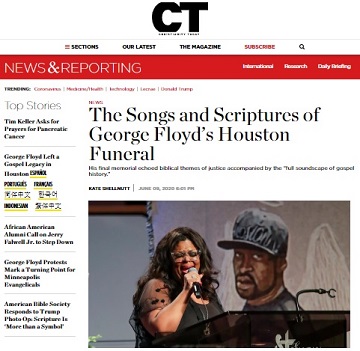 The funeral offered many opportunities for political comment, but it was also full of faith.
The funeral offered many opportunities for political comment, but it was also full of faith.
Kate Shellnutt wrote for Christianity Today:
The liturgy of Tuesday’s homegoing service for George Floyd reflected the Christian landscape of his hometown and the rich legacy of gospel music in the black church.
More than 500 loved ones, community leaders, and guests gathered at a Houston megachurch, Fountain of Praise, to remember a man whose death launched a movement.
The lineup for the service, the final memorial before Floyd’s burial that afternoon, included leaders of some of the most influential black megachurches in Houston as well as remarks from national figures like Joe Biden (by video) and Al Sharpton, who gave the eulogy.
Gospel greats Kim Burrell and Kurt Carr and R&B artist Ne-Yo were among the performers whose music carried mourners through the nearly four-hour event. . . .
The service began with Andrae Crouch’s “The Blood Will Never Lose its Power”: It soothes my doubts and calms my fears and it dries all my tears / The blood that gives me strength from day to day, it will never lose its power.
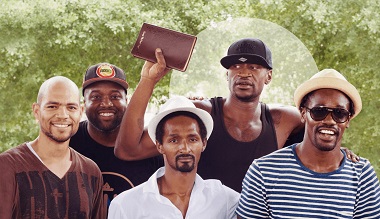 Go here for the full article. An earlier article by Shellnutt – ‘George Floyd Left a Gospel Legacy in Houston’ – described how, “as a person of peace, ‘Big Floyd’ opened up ministry opportunities in the Third Ward housing projects.”
Go here for the full article. An earlier article by Shellnutt – ‘George Floyd Left a Gospel Legacy in Houston’ – described how, “as a person of peace, ‘Big Floyd’ opened up ministry opportunities in the Third Ward housing projects.”
Faith ignored
If you didn’t participate in the funeral, or watch it online, however, you would likely have missed most of the religious content.
Terry Mattingly commented on GetReligion:
After reading several of the national-media reports, I think it’s clear that the principalities and powers of the establishment press watched the funeral and said to themselves: “That was all about politics.”
Was there a hefty dose of politics during the funeral? Of course there was.
Did this political content deserve news coverage? Of course it did.
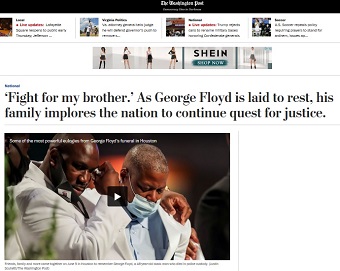 But if you read the mainstream coverage of the service, you would never know that Christian faith played a key role in the trouble life of George Floyd and of the mother who fought so hard to raise him right.
But if you read the mainstream coverage of the service, you would never know that Christian faith played a key role in the trouble life of George Floyd and of the mother who fought so hard to raise him right.
You would never know that references to Jesus and “the Lord” were heard during this service just as much, or more, than the names of major political figures or even Floyd himself. You wouldn’t know that Floyd – during some crucial years when he fought to pull his life together – was a major player in urban ministry projects in Houston’s Third Ward. He wasn’t just a “mentor” in sports programs.
Go here for the full comment.
Co-opting Christianity
While it is true that mainstream media shortchanges religion – and in this case overlooked the obvious solace afforded by the service, not to mention the fact that the political statements were grounded in religious belief – this is a good time for the broader church to take some time to listen, learn and re-focus on key gospel truths.
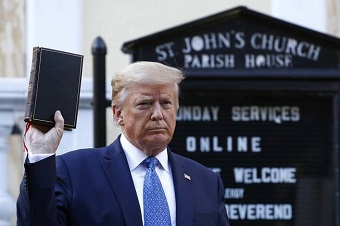 The fact that President Donald Trump decided to brandish a Bible in front of a church, after having the police clear peaceful protesters from Lafayette Square, shows that he and those with him believe they can rely on a religiously conditioned constituency to support, or at least acquiesce in, that kind of state violence.
The fact that President Donald Trump decided to brandish a Bible in front of a church, after having the police clear peaceful protesters from Lafayette Square, shows that he and those with him believe they can rely on a religiously conditioned constituency to support, or at least acquiesce in, that kind of state violence.
As Robyn J. Whitaker wrote for The Conversation, ‘Trump’s photo op with church and Bible was offensive, but not new.’ Taking note of the fact that quite a number of Christians objected, she said:
While Christian outrage at Trump’s hypocrisy is genuine, for reasons that several Christian leaders have elegantly articulated, we need to ask ourselves: did Trump do anything new? Has he done anything that powerful “Christian” leaders haven’t done for centuries?
The answer is no.
Co-opting Christianity in the service of power is almost as old as Christianity itself. In the culture war raging in America, the very president who has stoked the flames of racism and white supremacy effectively claimed God is on his side. It is deeply offensive, but it is not new.
Complicit
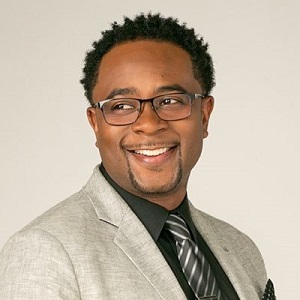
Jemar Tisby
Jemar Tisby, author of The Color of Compromise: The Truth About the American Church’s Complicity in Racism (Zondervan, 2019), tweeted June 9:
A long history
Some scholars and commentators have been writing about this reality for many years. Mark Noll, for example, now Research Professor of History at Regent College, is one of the world’s leading church historians. His History of Christianity in the United States and Canada (Eerdmans, revised edition 2019) is a standard text.
The back cover notes for God and Race in American Politics: A Short History (Princeton University Press, 2010) state:
Noll demonstrates how supporters and opponents of slavery and segregation drew equally on the Bible to justify the morality of their positions. He shows how a common evangelical heritage supported Jim Crow discrimination and contributed powerfully to the black theology of liberation preached by Martin Luther King Jr.
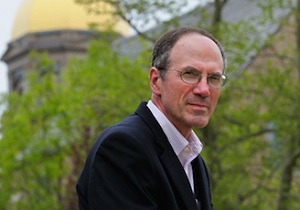
Mark Noll
Noll referred to Tisby during an April 28 interview in Religion & Politics; Tisby is a contributor to Noll’s new book (co-edited with fellow historians George Marsden and David Bebbington), Evangelicals: Who They Have Been, Are Now, and Could Be (Eerdmans, 2019).
Here is one excerpt:
R&P: Jemar Tisby takes up the question of whether African American Christians are evangelicals, and concludes that they are, but only within racial limits long drawn and enforced by whites. Is Sunday morning segregation somehow inherent to American evangelicalism?
MN: Certainly the principles of evangelical religion would suggest that ethnic or racial differences are secondary to unity in Christ. I only do contemporary things with the back of my hand – I’m really a historian of the 18th and 19th centuries – and I think the example of George Whitefield and Phyllis Wheatley is significant here.
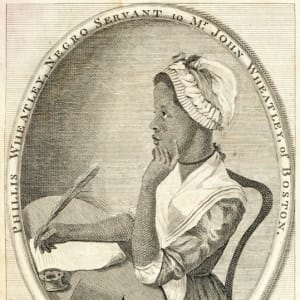
Phyllis Wheatley was kidnapped in Africa and brought to Boston on a slave ship.
When Whitefield died in 1770, Wheatley wrote a poem in his honor that praised him for preaching a message that reached African Americans. She won a considerable amount of renown when that poem was published.
Whitefield, who did actually insist that colonial blacks be allowed to attend his public meetings, was also an active promoter of slavery in Georgia because he needed slaves to make his orphanage profitable.
So the question is, does evangelical religion presuppose racial difference? Does it oppose racial difference? The answer is yes on both counts.
Historically, white and black evangelicals have been no more exempt from the enslaving and segregating traditions of American history than have other Americans. Theologically, there has been a consistent strand of black and white Christians who have intentionally tried to work together.
Tisby’s essay is really interesting in its treatment of the black evangelist Tom Skinner, who was, for a while, very well received in white evangelical communities. However, when he began to articulate themes calling on white evangelicals to repent of their participation in America’s racist history, Skinner lost a great deal of his credibility in white evangelical communities.
Tisby is implicitly raising the question – which is the more authentic evangelical history? The early part of Skinner’s career, when he was hailed as an effective evangelist all across the racial spectrum, or the latter part of his career, when he was ostracized by many white evangelicals for rocking the boat and drawing attention to the racist past? The answer depends upon the angle from which it is asked.
Go here for the full interview.
‘Fierce urgency of now’
Tisby said in another tweet, also June 9:
In his 1963 ‘I Have a Dream’ speech, Martin Luther King Jr. said the nation had to respond to the “fierce urgency of now.” His words still ring true. The time is now and long past to respond to the urgent need for racial justice. #ColorofCompromise
His 12-episode Color of Compromise Video Study offers a good place for Americans, and Canadians, to start.
This series provides a unique survey of American Christianity’s racial past, revealing the concrete and chilling ways people of faith have worked against racial justice. Understanding our racial history sets the stage for solutions, but until we understand the depth of the malady we won’t fully embrace the aggressive treatment it requires.
Given the centuries of Christian compromise with bigotry, believers today must be prepared to tear down old structures and build up new ones. This video study provides an in-depth diagnosis for a racially divided American church and suggests ways to foster a more equitable and inclusive environment among God’s people..
Some good resources
- IVP: Resources for Faithful Justice
 IVP is offering more than 50 free ebooks – but only until tomorrow (June 12)!
IVP is offering more than 50 free ebooks – but only until tomorrow (June 12)!
IVP is grateful for the prophetic voices of our authors who share their stories, educate us when we are uninformed, and challenge us with the truth. Learn from these books as we pursue justice, wholeness, and racial righteousness in our homes, churches, and communities. You can also read our commitment to amplifying voices of color.
To start reading right away, you can choose one ebook from this page to download for free. IVP will continue to pay the full royalties to the authors of these important books. Simply sign in, add the ebook to your cart, and use promo code JUST20 when you checkout. (Offer is for one-time use on one ebook title, now until June 12.)
Go here.
- Christianity Today: ‘Floyd funeral turning point for Minneapolis evangelicals’
In the week after the death of George Floyd, local evangelicals have participated in the citywide response, donating food and supplies and rallying volunteers for cleanup efforts. But as church leaders consider the long-term needs that will continue when the news cycle and national attention move on, they’ve realized how important it is to work together to coordinate their responses.
“People want to just do something, but that doesn’t mean we know what to do,” said Shawna Boren, the engagement pastor at Woodland Hills Church in St. Paul. “We’re really trying to be effective by listening to the churches in the neighborhoods that are affected and doing what they tell us to do.”
Go here for the full article.
- April Yamasaki: ‘Black Lives Matter in Canada
Writing on her ‘When You Work for the Church’ blog, April Yamasaki described parallels between the situation in the United States and Canada and “offered some links that I find helpful. Some address anti-black racism, others include racial injustice against Indigenous people and others.”
Go here for the full comment.
